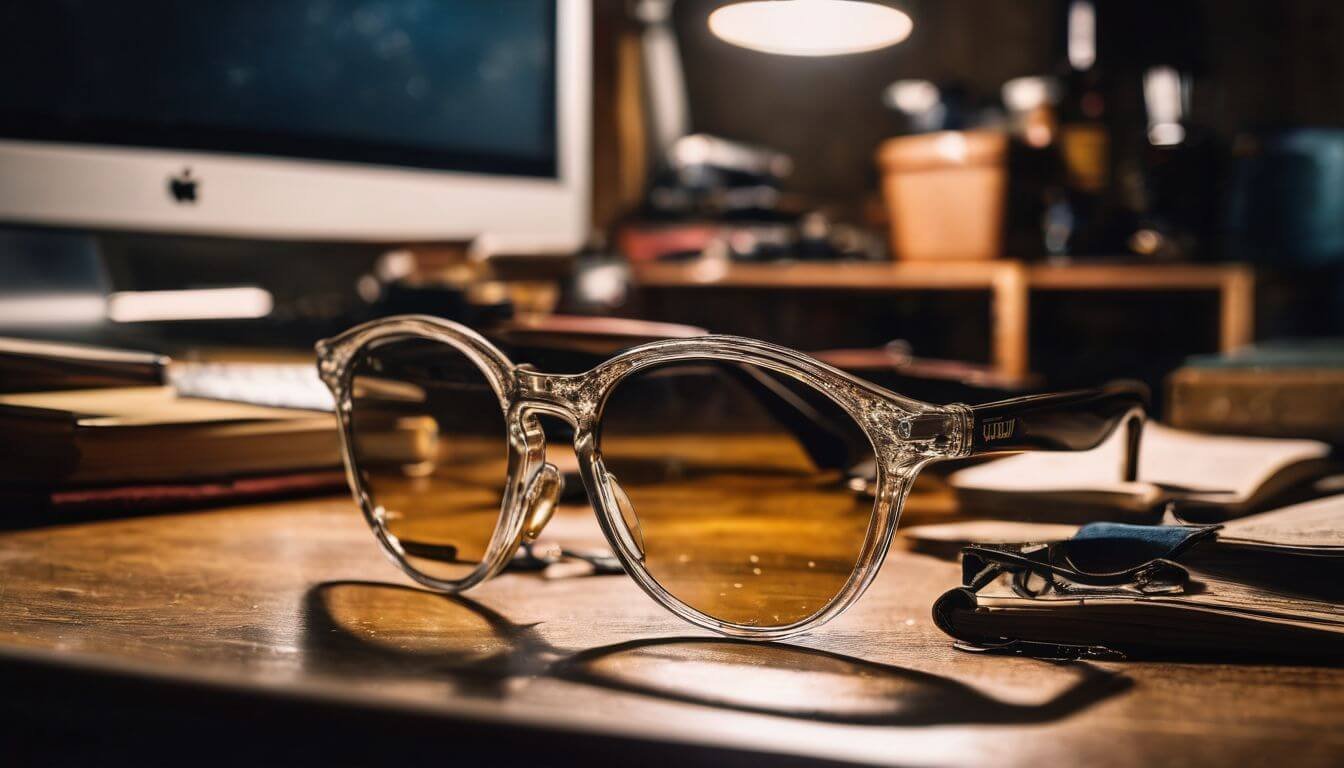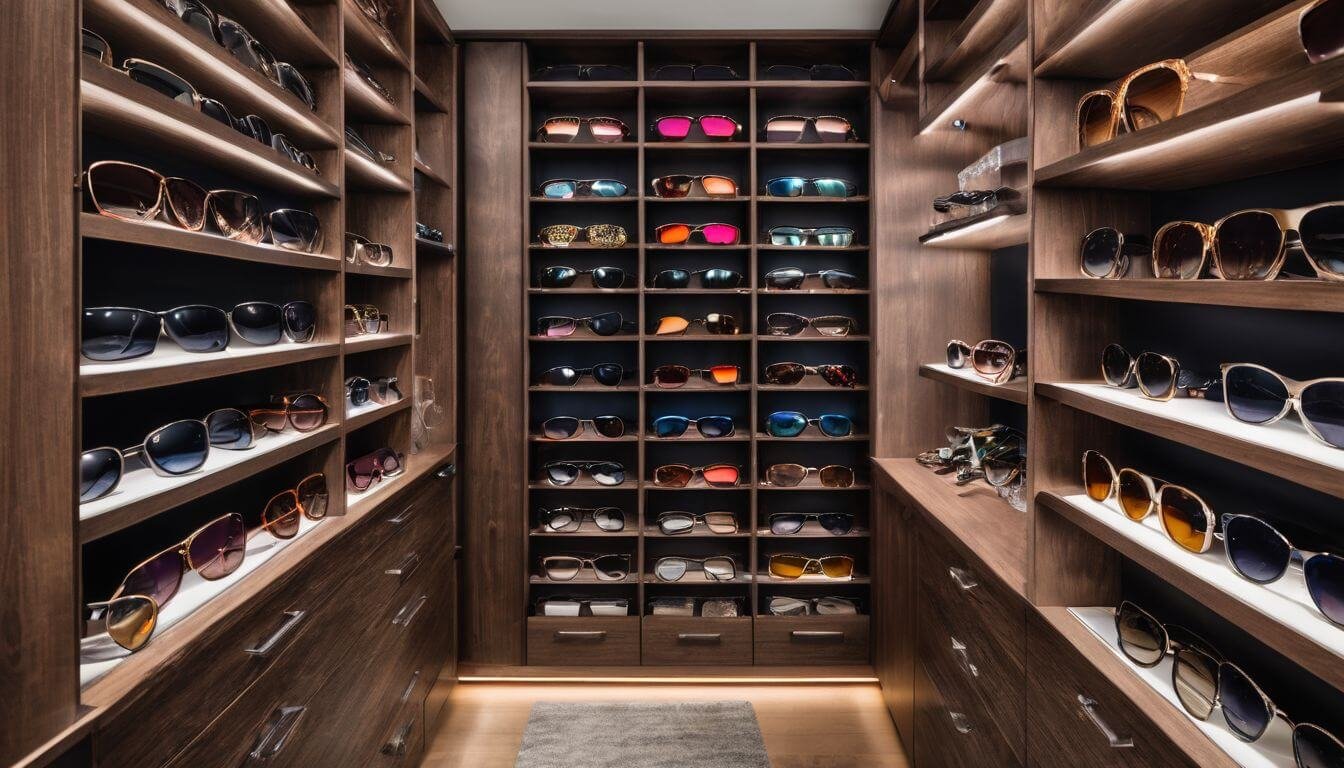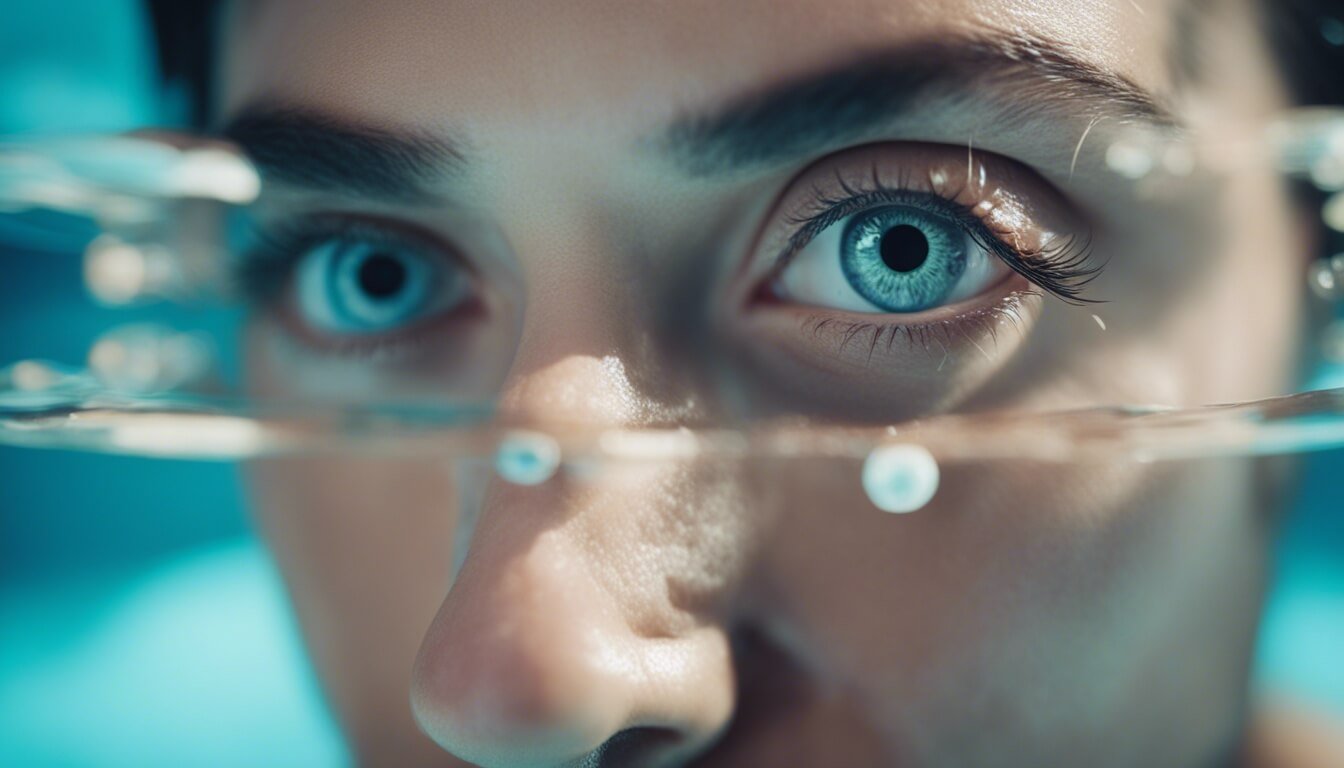
How Often Should You Get Your Eyes Checked: A Comprehensive Guide for Adults
Wondering how often to get your eyes checked? The American Optometric Association suggests adults should have an eye exam at least every two years. Our guide will break down the ideal frequency for eye checkups tailored to your age, lifestyle, and overall health.
Keep reading to see clearly why regular exams matter!
Key Takeaways
- Adults should have an eye exam every two to three years, but if you’re over 40 or have health issues like diabetes, you may need checks more often.
- Eye exams can spot hidden health problems such as high blood pressure or diabetes before other symptoms show up.
- Even if your vision is perfect, get regular eye exams to detect diseases early when they are easier to treat.
- If you wear glasses or contacts, bring them to your exam and get your eyes checked yearly or as recommended by your doctor.
- Use technology like special cameras and computers during an eye exam to catch any changes in your eyes quickly.
Importance of regular eye exams for maintaining vision and overall health
Regular eye exams are vital for catching eye problems early on. Some eye diseases, like glaucoma, start without symptoms. A doctor can spot these issues before they get worse and affect your vision.
Good vision helps you perform well—at home, at work, or behind the wheel. That’s why it’s essential to take proactive steps to protect your eyesight.
Eye checks also reveal clues about your overall health. They can help uncover diabetes, high blood pressure, and even risk factors for stroke. By looking inside your eyes, a doctor might see signs of conditions that could affect other parts of your body.
So getting an eye exam does more than just check if you need glasses or contacts – it’s a critical part of taking care of your whole body.
Overview of how eye exams can reveal general health issues
Eye doctors can spot early signs of diseases during eye exams. These exams often reveal health problems like diabetes, high blood pressure, or high cholesterol before you know they exist.
By looking at the blood vessels and condition of your retina, an optometrist might detect a serious health issue. They can also see signs of other conditions such as macular degeneration or glaucoma.
A comprehensive eye exam includes checking the health of your eyes and finding clues about your overall well-being.
Your eyes show more than vision problems; they are windows to body health too. Eye exams involve different tests using lights and lenses that help doctors look deep into your eyes.
The way light bounces off your retina tells them about possible risks for stroke or heart disease. Exams may include dilating pupils which allows a better view inside to check for diseases that affect not just your sight but overall health like diabetes or multiple sclerosis.
So, when you get an eye exam every one to two years as recommended, the doctor checks both vision needs and general wellness.
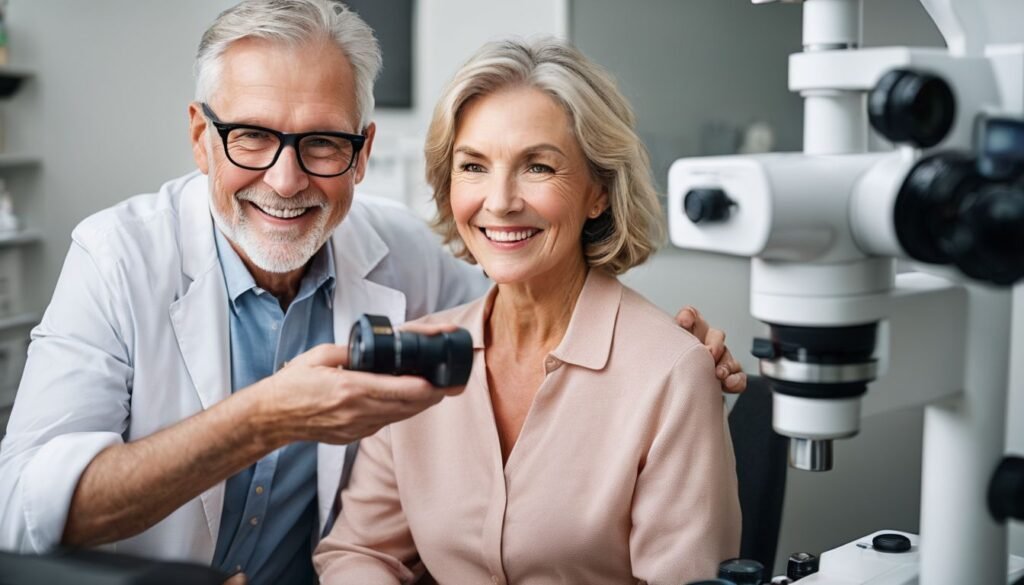
Recommended Frequency of Eye Exams
Adults should get complete eye exams every two to three years. If you are between 20 and 39 years old, optometry guidelines suggest an exam every five years. However, this can change based on your health and if you wear glasses or contacts.
For example, people who have had LASIK need to see their eye doctor every one to two years.
As you get older, it’s smart to go more often. Those over 40 should schedule routine check-ups because the risk for eye problems increases with age. After 50, experts advise even more frequent visits to catch any issues early on.
Remember that a healthy vision is a key part of overall well-being, so regular exams are essential for everyone.
Eye Exam Frequency by Age Group
Understanding when to schedule an eye exam is essential for protecting your sight and overall well-being. The frequency of these exams should be appropriate to your age group and specific health requirements.
| Age Group | Recommended Eye Exam Frequency |
|---|---|
| Children (3-18) | Every 1-2 years |
| Adults (20-39) | Every 5 years |
| Adults with risk factors (e.g., diabetes, history of eye diseases) | Every 1-2 years |
| Adults (40-54) | Every 2-4 years |
| Adults (55-64) | Every 1-3 years |
| Seniors (65+) | Every 1-2 years |
| Post-Refractive Surgery Patients | Every 1-2 years |
Scheduling eye exams is especially critical for seniors over 65, as they are advised to see their eye doctor more frequently. Remember, maintaining a schedule tailored to your age and health status is key for early detection and management of potential eye issues.
Factors Influencing Exam Frequency
Your eye exam frequency might change based on several things. Your age is a big factor. As you get older, you should go to the eye doctor more often. Health conditions like diabetes or high blood pressure can affect your eyes too.
If you have these health issues, you may need an eye exam more frequently.
Wearing glasses or contacts also plays a role in how often you see an eye doctor. If your vision changes a lot, the doctor will want to check your eyes more often. A family history of eye disease means you might need extra exams to catch problems early.
Don’t forget that past injuries to your eyes can mean more visits too. Always consult with your eye doctor about how often you should schedule exams for the best care for your eyes.

The Importance of Eye Exams for Everyone
Eye exams are important even for people with perfect vision. They help find problems early when they’re easier to treat. Doctors can spot signs of diseases that affect the whole body, like diabetes or high blood pressure, just by looking at your eyes.
Not only for catching sight issues but also maintaining overall health.
Lifestyle choices and daily habits impact eye health too. Staring at screens causes eye strain and might lead to more visits to the eye doctor. If you play sports or spend lots of time outdoors, protective eyewear is a must to prevent injuries.
Regular checkups ensure your eyes stay in top shape no matter what activities you enjoy.
Eye Exams for People with Perfect Vision
Even if you have perfect vision, regular eye exams are important. They help catch problems early on. Doctors say adults should get their eyes checked every one to two years. If you’re in your 20s and have no vision issues, an ophthalmologist may suggest one complete exam during that decade.
In your 30s, they might recommend two check-ups.
Eye checks can find hidden health issues, not just in your eyes but also in other parts of your body. Healthy-eyed folks still need these exams because some eye conditions don’t have clear warning signs.
So even without glasses or contacts, make sure to schedule routine visits with an eye doctor as part of caring for yourself.
Eye Health and Lifestyle Factors
Your daily habits play a big role in keeping your eyes healthy. Smoking, poor diet, and too much screen time can hurt your vision over time. Eating foods high in vitamins like carrots and leafy greens helps protect your eyes.
Wearing sunglasses guards against harmful UV rays when you’re outside.
Exercises that boost overall health also do good for your eyes. Regular physical activity can lower the risk of eye diseases like glaucoma. Make sure to rest your eyes if you spend many hours staring at screens to avoid strain or dryness.
Keeping a healthy weight may help prevent diabetes, which can lead to vision loss.
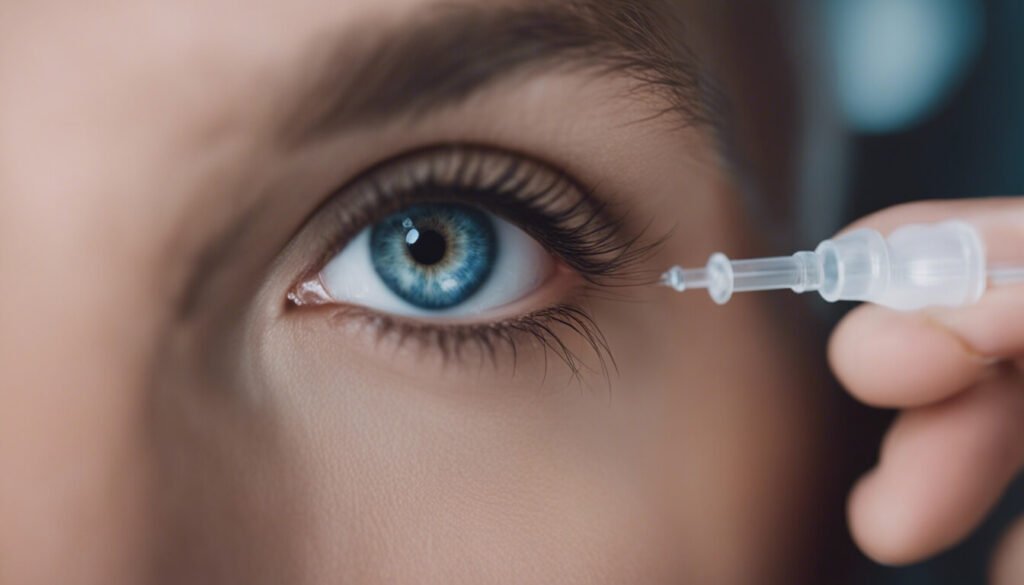
What to Expect During an Eye Exam
At your eye exam, the doctor will check your vision using an eye chart. You’ll read letters that get smaller line by line. This test measures how well you see at different distances.
The doctor will also look at the surface of your eyes and test your eye muscles. They use bright lights and special lenses to examine the health of both the inside and outside areas.
Eye drops may be used to dilate your pupils. This allows the doctor a better view inside your eyes to spot any problems like glaucoma or diabetic eye issues early on. They might also use technology to scan for diseases that affect vision over time.
After these exams, they can tell if you need glasses or contact lenses to improve sight or protect against further damage from conditions like dry eyes or previous trauma.
Components of a Comprehensive Eye Exam
Getting a comprehensive eye exam is key to keeping your eyes healthy. Your eye doctor checks for more than just vision problems during this visit.
- Vision Testing: This part of the exam assesses how well you see at various distances. It includes reading from an eye chart.
- Refraction Assessment: Determines your exact lens prescription. This step helps find out if you need glasses or contact lenses.
- Eye Muscle Test: This evaluates the muscles that control eye movement. Your doctor will watch how your eyes follow a moving object.
- Pupil Response: Checks how your pupils adjust to light and objects coming close. A doctor will shine a light into your eye for this test.
- Peripheral Vision: This test checks how well you can see out of the corners of your eyes.
- Pressure Measurement: Measures the pressure inside your eyes, which can be important for glaucoma detection.
- Front Part Examination: A special microscope called a slit lamp allows the doctor to see the structures at the front of your eyes in detail.
- Retinal Exam: To examine the back of your eyes, drops may be put in to dilate your pupils. The doctor looks for signs of damage or disease.
- Optic Nerve Check: Part of assessing for glaucoma and other conditions involves looking at the health of the optic nerve.

The Role of Technology in Eye Exams
Technology has changed how we get eye exams. Doctors use advanced machines to check our eyes in ways we never could before. They can take pictures inside your eye with special cameras.
These images help them find diseases like glaucoma early on. Machines also measure the pressure in your eyes quickly and painlessly.
Computers play a big part in checking your vision too. Tests that once needed lots of guesswork are now more accurate thanks to technology. Your eye doctor will test how well you see at different distances using a computer program.
This makes sure they give you the right glasses or contact lenses for your eyes. With new tech, doctors can keep an eye on changes over time, catching problems fast.
Special Considerations for Glasses Wearers
If you wear glasses or contact lenses, your eye exams might be a bit different. You’ll need extra tests to check your prescription. These tests make sure you have the correct lens strength.
Your doctor will also look for changes in your vision and update your glasses or contacts if needed.
Glasses users often get their eyes checked more often than those who don’t wear them. Make sure to tell your eye doctor about any problems with your glasses. They can help fix issues like glare, headaches, or anything that blurs your vision.
Your glasses should fit well and give clear sight at all distances.
Additional Steps in Eye Exams for Glasses Users
Glasses wearers need extra tests during eye exams. These help ensure the prescription is right and eyes stay healthy.
- The doctor checks your current glasses to see if the prescription is still correct.
- You’ll look through a special device called a phoropter. It tests different lens strengths to find the best one for you.
- A refraction test helps find the right power for your lenses. This test fine-tunes your prescription.
- The optometrist may do a binocular vision test. It checks how well your eyes work together.
- You might get an eye alignment test. This ensures your eyes are not turning in or out too much.
- The doctor looks at the health of your eye’s surface, important if you wear contacts too.
- They may measure your pupil’s response to light. Glasses must not make you too sensitive to sunlight.
- Your peripheral vision might be checked. Good side vision is key for those with glasses.
- The doctor will use tools to check the lens fit on your nose and ears. Your glasses should be comfy and secure.
- Discuss any issues like headaches with your doctor. They can adjust the glasses’ design or fit to help fix them.

Preparing for Your Eye Exam
Getting ready for your eye exam is simple. Follow these steps to make sure you’re prepared for your appointment.
- Check your medical history and note any vision problems, previous eye trauma, or surgeries before the visit.
- Make a list of all medications you are currently taking, including over-the-counter drugs and supplements.
- If you wear glasses or contact lenses, bring them along with any prescription information.
- Write down any questions or concerns about your eyesight or eye health so you don’t forget to ask the doctor.
- Plan to discuss any recent changes in your vision, such as difficulty seeing at night or while reading.
- If going for a dilated eye exam, arrange for someone to drive you home since your vision may be blurry afterwards.
- Confirm if you need a routine eye exam or a more specialized test like a contact lens exam based on your needs.
- Ensure that you know how often you should get an eye exam as recommended by your doctor—especially important if over age 40 or if you have risk factors for eye diseases.
- Rest well the night before the exam to help keep your eyes from being tired during the tests.
- Avoid wearing eye makeup to the appointment; it can interfere with some exams.
How to Prepare for an Optometry Appointment
Preparing for your optometry appointment is simple. Here’s what you need to do to make sure your visit goes smoothly.
- Check your vision insurance before you schedule your appointment. Know what services are covered.
- Write down any eye problems you are having, like trouble reading or blurry vision.
- List all the medicines you take. Some can affect your eyes.
- Bring glasses or contact lenses you currently use to the exam.
- Note the dates of past eye exams and surgeries. Share this history with your eye doctor.
- Think about your family’s eye health. Let your doctor know about any relatives with eye disease.
- Rest well the night before. Tired eyes can affect test results.
- Avoid wearing eye makeup to the exam. It can get in the way of certain tests.
- Plan to discuss lifestyle habits that can impact vision, such as screen time or sun exposure.
- Prepare for dilated pupils during your visit. This means bringing sunglasses for the drive home.
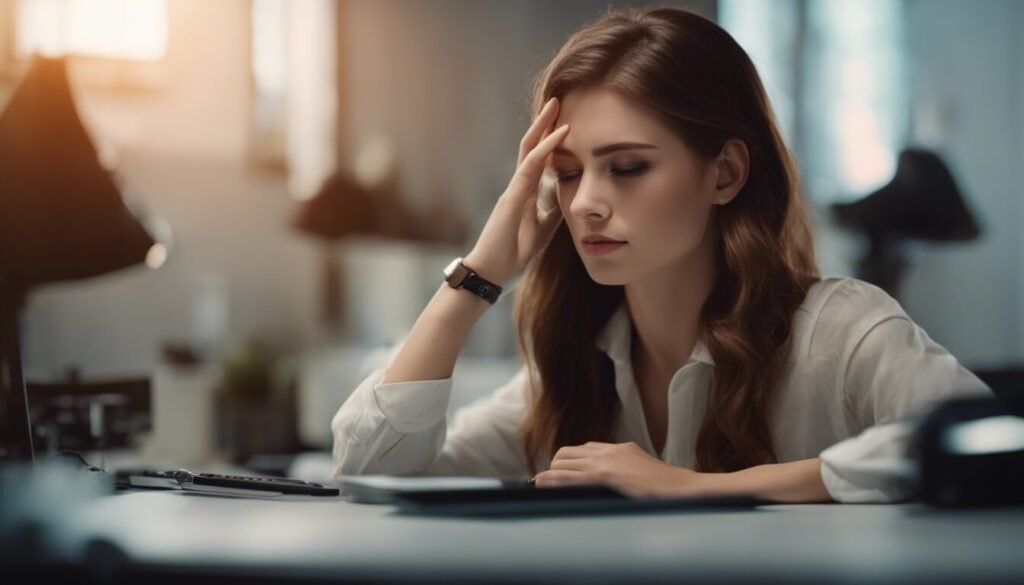
Other Types of Eye Exams
Specialized eye exams exist for different health risks. If you have diabetes, your doctor might use a test to look for signs of diabetic retinopathy. This condition can lead to vision loss if not treated early.
Some tests check for glaucoma too. Glaucoma is an eye disease where the pressure inside your eyes gets too high and can damage your sight. These specialized exams help spot problems before they get worse.
If you work on computers a lot or use digital devices often, you might need an exam to see if this is straining your eyes. Doctors call this computer vision syndrome and they will suggest ways to protect your eyes.
Athletes may go for sports vision testing as well. These tests check how well their eyes perform under game conditions.
Specialized Eye Exams Based on Health Risks
Taking care of your eyes is crucial. Special eye exams may be needed if you have certain health risks.
- If you have diabetes, get a dilated eye exam every year. Diabetes can harm blood vessels in the eye.
- People with a high risk of glaucoma should see their eye doctor often. Glaucoma tests check for pressure in your eyes.
- Adults who wear contacts need annual exams. Contacts can cause changes or damage if not checked.
- Have an exam every two to three years if you’re over 40. Your chance of eye diseases goes up as you get older.
- Visit the eye doctor right away if you notice sudden vision changes or pain. These could be signs of serious problems.
- Eye exams are essential for those with a family history of eye disease. The doctor will look for early signs of trouble.
- Set an appointment with your eye doctor if you spend many hours on screens. Long screen time can strain and harm your eyes.
- Get regular checks after LASIK surgery every one to two years. Surgeons need to monitor your eyes’ health post-surgery.
- Annual eye exams are vital for people with high blood pressure or other heart diseases. They can affect the vessels in your eyes too.
Conclusion
Get your eyes checked to keep them healthy. Follow age and health guidelines for eye exam schedules. Regular checks catch problems early. See an eye doctor even if you have good vision.
Stay on top of your eye care needs!
FAQ
Q: How often should you go for an eye exam?
A: It is recommended to get a comprehensive eye exam every two to four years if you don’t wear glasses or have any other risk factors for eye disease. However, if you wear glasses or are at a higher risk for eye diseases such as glaucoma, your eye doctor may recommend more frequent visits.
Q: Why is a routine eye exam important?
A: Routine eye exams are important for the early detection of eye diseases and vision problems. They also help in assessing the overall health of your eyes, which is crucial for maintaining good vision and preventing potential eye conditions.
Q: How often do you need to see an eye doctor?
A: The frequency of visiting an eye doctor depends on your age, overall eye health, and whether you wear glasses or contact lenses. It is recommended to follow the guidance of your eye doctor regarding the optimal frequency of visits.
Q: What is a comprehensive eye exam?
A: A comprehensive eye exam is a thorough evaluation of your vision and eye health. It includes various tests and assessments to check for refractive errors, eye diseases, and overall eye function. This type of exam provides a holistic view of your eye health.
Q: When should you get your next eye exam?
A: The timing of your next eye exam is typically recommended by your eye doctor based on your individual eye health and needs. However, as a general guideline, adults should have an eye exam at least every two years, and more frequently if advised by their eye doctor.
Q: Why do adults who wear glasses or contact lenses need regular eye exams?
A: Adults who wear glasses and contact lenses may need regular eye exams to ensure that their prescriptions are up to date and to monitor for any changes in their vision. Additionally, these individuals are at a higher risk for certain eye conditions, making regular exams essential for their eye health.
Q: How does an eye exam contribute to overall eye health?
A: An eye exam is not only about assessing vision; it also plays a crucial role in the early detection of eye diseases and conditions such as glaucoma, cataracts, and macular degeneration. Regular eye exams are vital for maintaining overall eye health and preventing potential vision problems.
Q: What is the importance of a contact lens exam?
A: A contact lens exam is essential for ensuring the proper fit and function of contact lenses, as well as assessing the overall health of the eyes while wearing them. This type of exam helps in preventing potential issues related to contact lens wear and maintaining optimal vision and eye health.
Q: Is there a specific age when the frequency of eye exams should increase?
A: As individuals reach the age of 65, the risk for certain eye diseases and conditions tends to increase. Therefore, it is advisable for older adults to consider more frequent eye exams and to be proactive in monitoring their vision and overall eye health.
Q: When should someone with no vision problems have their first eye exam?
A: The first eye exam for individuals with no vision problems is recommended to be scheduled during childhood. It is important to have the eyes assessed at an early age to detect any potential issues and ensure proper visual development.



